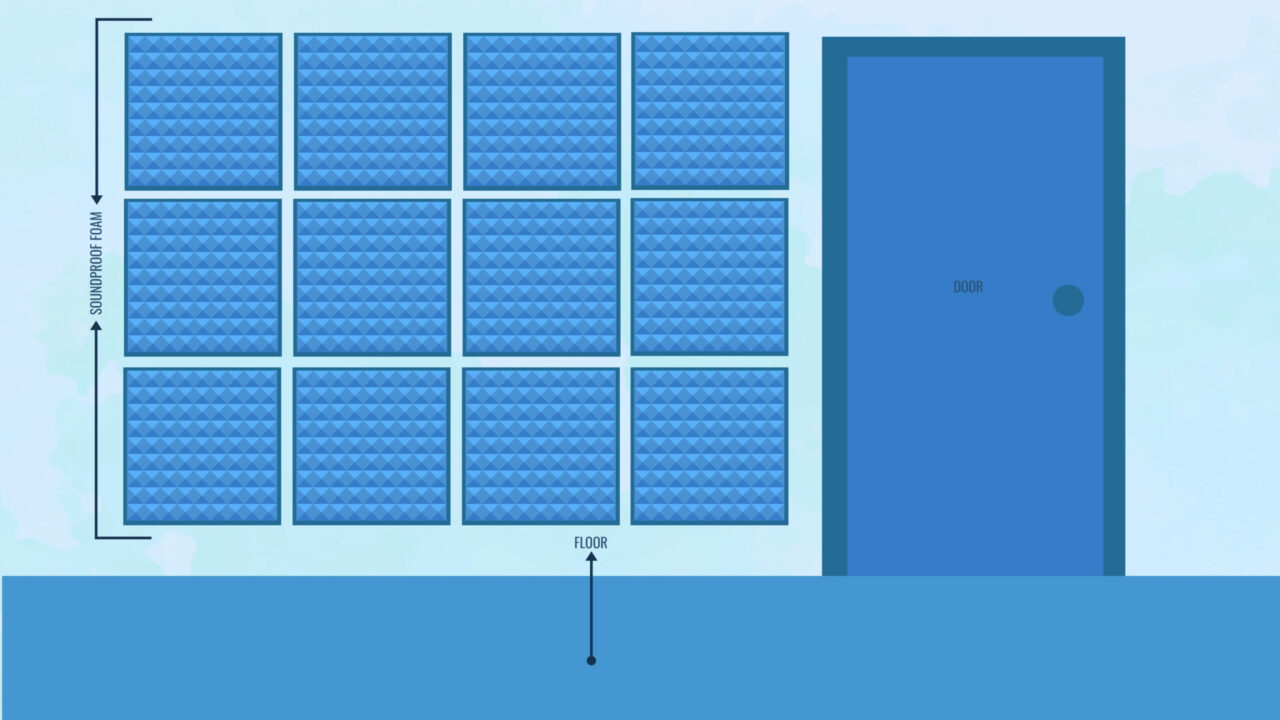A noisy garage can attract unwanted attention and noise complaints from neighbors and passersby. Luckily, there are numerous ways to easily get your garage door soundproof, depending on your budget and preferences.
Soundproofing your garage door can be a trial-and-error process. There’s no perfect method for doing this process.
We’ve gathered the most common ways you can soundproof your garage door. One of these is sure to work for you.
How to Soundproof a Garage Door in 7 Ways

Soundproofing a garage door can have many steps and trials before you can get it right. It may depend on your garage’s overall structure and the soundproofing materials used.
These are the 7 most common soundproofing methods that can help reduce sounds from your garage door.
1: Plugging the Garage Door Windows
One of the most common ways you can soundproof your garage door is by blocking its windows.
You can use acoustic panels, a backing board, and an old cabinet door handle. Have them fitted according to your window frame’s depth.
Get your frame’s depth and divide it by half. That’s how deep your window plug should go. Have it sit against the frame.
You can also use acoustic blankets or moving blankets as an alternative. Cut them down depending on the size of your garage door window frame.
If you want an easier alternative, you can use noise-blocking curtains.
Simply hang them over the window pane of your garage door for less noise. You’ll also need to install a curtain rod for this alternative.
Note
Noise-blocking curtains require more durable curtain rods because they’re heavier than normal curtains.
2: Add a Sound Maze or Remove Your Air Vents
Your garage doors usually have air vents for ventilation, especially during those hot summers. While they’re great for insulation, they can also contribute to garage noise.
The first thing you can do is create an air vent sound maze.
Trim your acoustic panels and attach them to wooden sticks using green glue adhesive. Then, arrange them similarly to the illustration above.
The little maze will help with reducing noise transmission. The barriers slow any airborne noise from entering or exiting the garage door.
If this method fails, you can remove the air vent instead. It will prevent noise from traveling in and out of your garage door altogether.
The downside to this will be less access to fresh air. However, you can use fans or a window air conditioner for ventilation.
3: Add Acoustic Foam Panels on the Walls

While this is the more expensive choice, your garage door will look more professional when you install acoustic foam panels on them.
Soundproof panels are highly recommended if you’re looking for a recording studio aesthetic while blocking out noise.
PRO-TIP
Adding rubber mats can also lessen echo and improve the acoustics of your garage, making them great for the studio aesthetic.
You can easily find these acoustic panels on Amazon. They’re usually an inch thick, which makes them great for catching echoes.
These soundproofing foam panels are specially made for mid to high frequencies.
Installing acoustic foam panels is also easy. You’ll only need to attach them to the wall using adhesives.
You won’t need to install them on your garage ceiling or floor. Keep them on your door, walls, and windows.
4: Block the Gaps
Gaps in your garage doors contribute greatly to the spread of airborne noise. They let air and noise into your space.
You have to make sure that there aren’t any gaps around the sides, top, or bottom. You can use a garage door seal kit to block these gaps out.
It would help if you also replaced the weatherstripping tape regularly. These can be strained over time and cause a sound leak if not replaced.
For larger gaps, you can use high-density foam tape. However, you’ll have to make sure that you can still open and close your garage door with this on.
5: Attach Acoustic Blankets to Roll-up Garage Door
Another common soundproofing material would be sound-deadening blankets. There are different kinds to choose from, depending on your budget.
You’ll have to be careful when installing these onto your roll-up garage door. Remove these blankets whenever you open your garage door, so they don’t get caught in the mechanism.
Acoustic blankets are the most known for soundproofing. It cuts down vibration and noise, which will help prevent sound.
A cheaper alternative would be moving blankets. However, you’ll need to use more than one layer of moving blankets to make these effective.
You can easily install these sound-deadening blankets by cutting and hanging them up against your garage door.
6: Insulate Garage Doors With Fiberglass Panels

Insulation doesn’t only block out temperatures but sounds too. You can use fiberglass panels to improve insulation and soundproofing in one modification.
Simply install them onto the garage door using hanging strips or green glue.
You can also use mass-loaded vinyl as a cheaper alternative to fiberglass panels. Their installation methods are similar.
The major downside of mass-loaded vinyl is that it’s not structured like a panel. Instead, it’s a single soundproofing barrier that is more solid.
Mass-loaded vinyl is also commonly used for other sound issues within the house, making it a great alternative to fiberglass.
7: Replace Your Existing Garage Door
If all the previous methods fail, it’s probably time to get a new garage door.
Getting an insulated garage door will help improve your entire garage. Unlike the standard garage doors, these can better contain soundwaves.
They also double as thermal insulation, which can help lower electricity bills in the long run.
This alternative may be expensive, and you would need a reasonable budget to achieve it. However, it serves as an investment for a soundproof garage door.
While you won’t get a completely silent insulated garage door, it will still keep MOST of the unwanted noise out.
Why Is It Important to Soundproof Your Garage Door?

Sometimes, having your garage walls soundproofed isn’t enough. Your garage door occupies a large area of the garage’s structure. It would need extra soundproofing for privacy and noise regulation.
When you soundproof a garage door, you can reduce the amount of noise that enters and exists. You’d want little noise intrusion from the outside while keeping the world from knowing every move.
Combining a soundproof wall and garage door with materials like thick carpets helps regulate noise levels while you enjoy your hobbies.
It allows you to use the garage however you like. Besides having a place to park your car, this space is usually used for band rehearsals, gyms, or workshops.
Having a soundproof garage door also improves your garage’s insulating qualities. Since it helps prevent heat transfer, it will make the garage more comfortable while decreasing utility bills.
What Are the Different Types of Sound?
It’s important to know what kind of noise you’re trying to block out if you’re going to soundproof a garage door. Each noise can be blocked out using specific methods.
You can easily determine the different noises blocked by your garage door. You can do this by simply placing your hand on it.
You may encounter these two types of noises.
Airborne Noise
Airborne noise is the most common noise which comes from voices, music, and power tools.
When objects make noise, their sound waves travel through the air. Once these soundwaves collide with a solid object (like your garage door), it will create a vibration and make a sound.
If you place your hand on the garage door and don’t feel any vibrations while you hear noise, you have an airborne noise.
Structure-borne Noise
Structural or impact noise is the sound of rain hitting the door or knocking on the garage door.
It requires two objects to have a physical impact. The contact causes the vibration, which we hear as noise.
If you play your hand on the garage door and feel vibrations while you hear a noise, you have a structure-borne noise.

Frequently Asked Questions
You may have more questions about soundproof garage doors and their benefits. We’ve gathered the commonly asked questions on this topic to help you further understand its importance.
What Are the Advantages of Soundproofing Your Garage Door?
There are many reasons to soundproof a garage door.
The main reason why people do this is to regulate unwanted noise from inside or outside. It helps you focus on projects without outside noise. It also prevents
Garage soundproofing also improves the sound quality in your garage. With a soundproof garage, reducing echo is also a lot easier. It’s a bonus when you have garage band practice.
Lastly, it helps conserve electricity. It contributes to your wall insulation and reduces the effects of the natural environment.
What Is the Difference Between Soundproofing and Sound Absorption?
Although these terms are usually used interchangeably, they differ greatly in their purpose and results.
Soundproofing
When you soundproof a room, it refers to the action of blocking noise. It usually aims to have the tools completely absorb sound.
It’s when an insulating or soundproofing material stops sound from entering and leaving a room.
Normally, the surrounding walls of a room are modified to soundproof the whole room.
A soundproofing material is usually solid and heavy. These thick materials must be dense enough to keep sound in an enclosed space to prevent it from spreading.
Sound Absorption
Unlike soundproofing materials, those used for sound absorption only lessen the echo and noise within a space.
It can use soft materials that help with sound insulation. They can be applied to the walls or ceilings to absorb vibrations from within the room.
While this term is less heard, we’re more likely to use it when looking for soundproofing solutions.
Conclusion
Soundproofing your garage door is a great way to prevent disturbances for you and your neighbors.
While there isn’t a 100% way to keep sounds out the door, noise reduction already does a lot.
Try these methods and see which would work best for your garage door.


